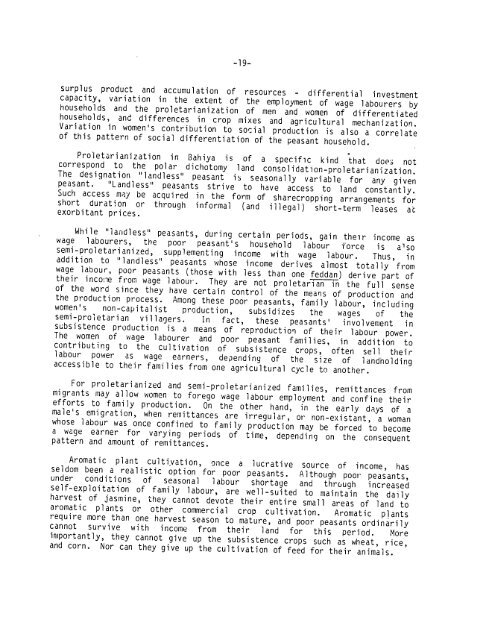FAMILIAL ADAPTATIONS TO THE INTERNATIONALIZATION OF ...
FAMILIAL ADAPTATIONS TO THE INTERNATIONALIZATION OF ...
FAMILIAL ADAPTATIONS TO THE INTERNATIONALIZATION OF ...
Create successful ePaper yourself
Turn your PDF publications into a flip-book with our unique Google optimized e-Paper software.
-19<br />
surplus product and accumulation of resources<br />
capacity, - differential<br />
variation<br />
investment<br />
in the extent of the employment<br />
households<br />
of wage labourers<br />
and the proletarianization<br />
by<br />
of men and women<br />
households,<br />
of differentiated<br />
and differences in crop mixes and agricultural<br />
Variation in<br />
mechanization.<br />
women's contribution to social production<br />
of<br />
is<br />
this<br />
also<br />
pattern<br />
a correlate<br />
of social differentiation of the peasant household.<br />
Proletarianization in Bahiya is of a specific<br />
correspond<br />
kind that<br />
to<br />
does<br />
the<br />
not<br />
polar dichotomy land consolidation-proletarianization.<br />
The designation "landless" peasant is seasonally variable<br />
peasant.<br />
for<br />
"Landless"<br />
any given<br />
peasants strive to have access<br />
Such<br />
to<br />
access<br />
land<br />
may<br />
constantly.<br />
be acquired in the form of sharecropping<br />
short duration<br />
arrangements<br />
or through<br />
for<br />
informal (and illegal) short-term leases at<br />
exorbitant prices.<br />
While "landless" peasants, during certain periods,<br />
wage<br />
gain<br />
labourers,<br />
their income<br />
the<br />
as<br />
poor peasant's household labour <br />
semi-proletarianized, <br />
force is also<br />
supplementing income with wage<br />
addition<br />
labour.<br />
to "landless"<br />
Thus, in<br />
peasants whose income derives<br />
wage<br />
almost<br />
labour,<br />
totally<br />
poor peasants<br />
from<br />
(those with less than one<br />
their<br />
feddan)<br />
inco:ie<br />
derive<br />
from wage<br />
part<br />
labour.<br />
of<br />
They are not proletarian in<br />
of<br />
the<br />
the<br />
full<br />
word<br />
sense<br />
since they have certain control of<br />
the<br />
the<br />
production<br />
means of production<br />
process. Among<br />
and<br />
these poor peasants,<br />
women's<br />
family labour,<br />
non-capitalist<br />
including<br />
production, subsidizes<br />
semi-proletarian<br />
the wages of<br />
villagers.<br />
the<br />
In fact, these peasants'<br />
subsistence involvement<br />
production in<br />
is a means of reproduction<br />
The<br />
of<br />
women<br />
their<br />
of<br />
labour<br />
wage<br />
power.<br />
labourer and poor peasant families,<br />
contributing<br />
in addition<br />
to the<br />
to<br />
cultivation of subsistence<br />
labour<br />
crops,<br />
power<br />
often<br />
as<br />
sell<br />
wage<br />
their<br />
earners, depending of the<br />
accessible<br />
size of<br />
to<br />
landholding<br />
their families from one agricultural cycle to another.<br />
For proletarianized and semi-proletarianized families, remittances from<br />
migrants may allow women to forego wage labour employment and confine their<br />
efforts to family production. On the other hand, in the early days of a<br />
male's emigration, when remittances are irregular, or, non-existant, a woman<br />
whose labour was once confined to family production may be forced to become<br />
a wage earner for varying periods of time, depending on the consequent<br />
pattern and amount of remittances.<br />
Aromatic plant culti.vation, once a lucrative<br />
seldom<br />
source<br />
been<br />
of<br />
a<br />
income,<br />
realistic<br />
has<br />
option for poor peasants.<br />
under<br />
Although<br />
conditions<br />
poor<br />
of<br />
peasants,<br />
seasonal labour shortage and <br />
self-exploitation<br />
through increased<br />
of family labour, are well-suited<br />
harvest<br />
to<br />
of<br />
maintain<br />
jasmine,<br />
the<br />
they<br />
daily<br />
cannot devote their entire small<br />
aromatic <br />
areas<br />
plants<br />
of land<br />
or<br />
to<br />
other commercial crop cultivation. <br />
require more than<br />
Aromatic<br />
one harvest<br />
plants<br />
season to mature, and poor<br />
cannot<br />
peasants<br />
survive<br />
ordinarily<br />
with income from their land<br />
importantly,<br />
for this period.<br />
they cannot<br />
More<br />
give up the subsistence crops such<br />
and<br />
as<br />
corn.<br />
wheat,<br />
Nor<br />
rice,<br />
can they give up the cultivation of feed for their animals.
















